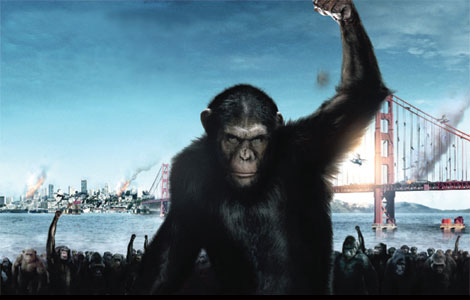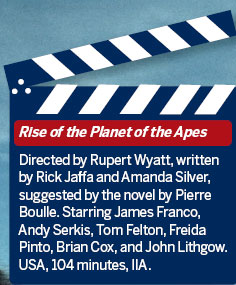Hail, Caesar
Updated: 2011-08-13 07:04
By Elizabeth Kerr(HK Edition)
|
|||||||

Unnecessary but not unenjoyable origin story doesn't embarrass itself. Elizabeth Kerr reports.

Another year, another "origin" story for a tried and true property. With forward momentum seemingly so difficult for so many film franchises, it's no wonder that producers resort to going back to the beginning, as it were, in order to generate progress. Sometimes it works, and sometimes it really doesn't. Wolverine could have been much more compelling, but the enigmatic fan favorite X-Man didn't really need his roots fleshed out in so many words: Wolverine was just fine as a character to be unraveled, interpreted, and re-interpreted. And the Predator, from, erm, Predator, and the Alien from, uh, Alien, certainly didn't need a convoluted and contrived explanation of their motivations under any circumstances. Bogeymen and superheroes just are, and they work like that just fine.
However, Batman Begins changed the rules of the game. Christopher Nolan's reboot of a tired classic told the backstory we all may or may not have known - accepted mythology be damned. In the process, he raised the angsty, complex icon to a level not seen on screen to that point (admit it, Spider-Man was basically a mopey teenager). Of course, comic book heroes aren't the only ones to be feted with pre-sequels of their own.
For Rise of the Planet of the Apes, writers Rick Jaffa and Amanda Silver go back to before the time of Pierre Boulle's original sci-fi novel, Monkey Planet, which of course is the source material for the classic Charlton Heston vehicle, Planet of the Apes. There are few children of the '70s who can't vividly recall the first time they saw that film and the shocking closing shot that demanded viewers rethink everything they'd just seen: PotA is a classic for a reason. We know it was hubris that brought the world of the original novel and film into being. Do we really need to know what went down every step of the way? Probably not. No one's been clamoring for a detailed description of what led to the death of Earth and the birth of Monkey Planet. But given that it's here, hey, why not? It's one of the few origin stories compelling enough to check out.

So here we are in the past, also know as our collective Now. Will Rodman (James Franco, 127 Hours) is a brilliant bio-researcher working for Big Pharma soon-to-be-troublemaker Gen-Sys when he develops what appears to be a cure for Alzheimer's. He has the requisite personal connection to the research, which clouds his better judgment and leads to the fatal error of taking home a lab chimp when its mother is killed in a disastrous presentation to the board of directors. Years go by and the chimp turns into Caesar (pre-eminent - okay, only - motion performance capture actor Andy Serkis). Caesar is smarter than other apes, more connected to humanity, and becomes intensely intimate with its dark side, courtesy of inhumane primate sanctuary operators Landon (Brian Cox, the first Hannibal Lecter, Rob Roy) and Dodge (Tom Felton, Harry Potter's Draco Malfoy). Cue the revolution.
Weta Digital - a little effects studio out of New Zealand whose work you may recognize from Avatar and Lord of the Rings - has once again created photorealistic "characters" rendered in a combination of performance capture and CGI, but this time dozens of them, set against a current backdrop that exists in reality. Weta is clearly picking up its game; despite a few dodgy moments the monkey effects are flawless. Even still, without Serkis, RotPotA would be nowhere.
True, Franco's Will is the pivot of the story, an ambitious man stuck at the crossroads of filial devotion, scientific curiosity, and, with Caesar a de facto son that comes into Will's life as his own father Charles (John Lithgow) slips away, parental protectiveness. But it is Serkis that is the beating heart of the movie regardless of the themes (our worship of drug companies and modern Frankenstein science among them). After bringing motion capture some respect with his performance as Gollum in LotR and a few years later as Kong in King Kong, Serkis is the reigning master of the technology on the actor's side. It helps that the man can actually act without the aid of a blue and/or green screen (check him out in indie British drama Extraordinary Rendition), but he seems to really get that it's a tool. And that makes Caesar utterly convincing. Serkis is in total control of the story almost from minute one. His Caesar is nuanced and empathetic, and to say you can see what he's thinking is a dramatic understatement.
A great deal of one's enjoyment of RotPotA will depend on knowledge of the original partnered with tolerance for modern spectacle silliness. Genetic mutation, pharmaceutical recklessness, and our innate penchant for playing God ground the story in reality, but it's still heading toward talking, mounted monkeys and Charlton Heston in a loincloth. On top of it, every character and moment is cued perfectly for efficient functionality rather than pure storytelling (gee, will the blowhard neighbor "get his" eventually?). If there's a serious flaw it's in the film's pacing. The film moves with such gusto viewers are barely able to catch their collective breaths before moving from one key sequence to the next.
Still, purists should be pleased: Jaffa and Silver manage to fit the "damn dirty ape" line into the film, the title font is lifted right from 1968, and Wyatt's march to the inevitable moment when the future "begins" is spine-chilling. For the rest of the time, RotPotA is formulaic and largely predictable with regards to characterization, plot cues, and emotional manipulation (look how cute baby Caesar is!). Rise of the Planet of the Apes is an entertaining trifle that neither offends its own legacy nor brings much that's new to the table. It does remain true to the downbeat tone of the original film and dovetails nicely with Boulle and original director Franklin Schaffner's bleak worldview. It's also an enormous improvement on Tim Burton's failed 2001 remake. And besides, a little simian apocalypse never hurt anyone.
Rise of the Planet of the Apes opened in Hong Kong on Thursday.
|
Trouble brews among some angry chimps, all gorgeously rendered in photorealistic CGI in Rise of the Planet of the Apes. |
(HK Edition 08/13/2011 page4)
